Ethical Issues of ICT Technologies: Driverless Cars and Ethics
VerifiedAdded on 2020/05/16
|9
|1538
|86
Report
AI Summary
This report delves into the ethical complexities surrounding driverless car technology, examining the moral dilemmas that arise when autonomous vehicles make decisions. It explores the challenges of programming ethical considerations into self-driving cars, including the allocation of responsibility in accidents and the application of utilitarian principles. The report highlights the need to address safety concerns and the potential impact of this technology on society, considering the perspectives of various stakeholders, including car manufacturers, software engineers, and the public. It evaluates how ethical frameworks, such as utilitarianism, can be applied to minimize harm and ensure the responsible development and deployment of driverless cars. The study concludes that while the technology offers potential benefits, careful consideration of ethical issues is essential for its successful integration into society.
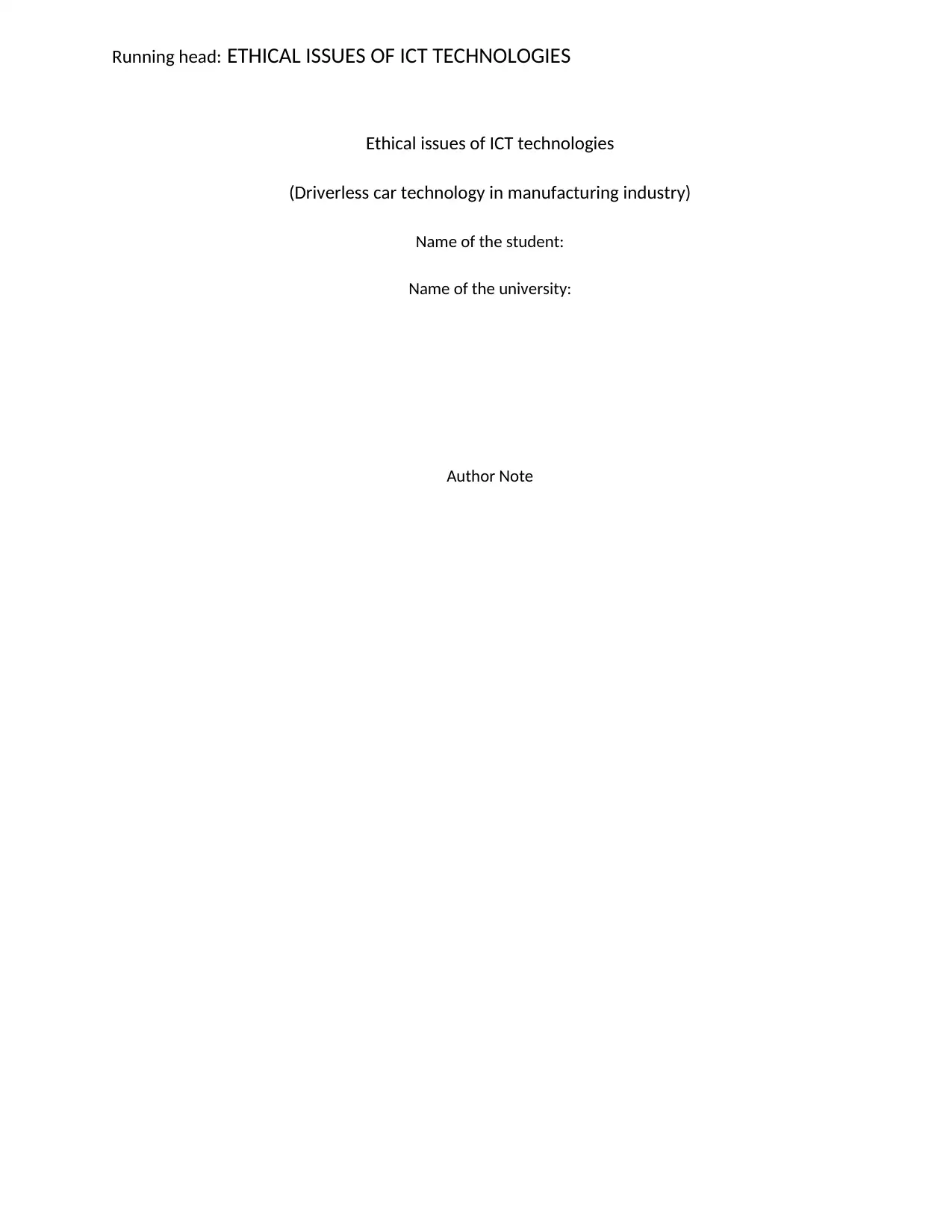
Running head: ETHICAL ISSUES OF ICT TECHNOLOGIES
Ethical issues of ICT technologies
(Driverless car technology in manufacturing industry)
Name of the student:
Name of the university:
Author Note
Ethical issues of ICT technologies
(Driverless car technology in manufacturing industry)
Name of the student:
Name of the university:
Author Note
Paraphrase This Document
Need a fresh take? Get an instant paraphrase of this document with our AI Paraphraser

1ETHICAL ISSUES OF ICT TECHNOLOGIES
Executive summary
The driverless cars are a vehicle designed for travelling to various destinations without any help of human
interference. The report analyzes ethical issues because of driverless cars. Further, it demonstrates the
efficiency of the technology from an ethical perspective.
Executive summary
The driverless cars are a vehicle designed for travelling to various destinations without any help of human
interference. The report analyzes ethical issues because of driverless cars. Further, it demonstrates the
efficiency of the technology from an ethical perspective.
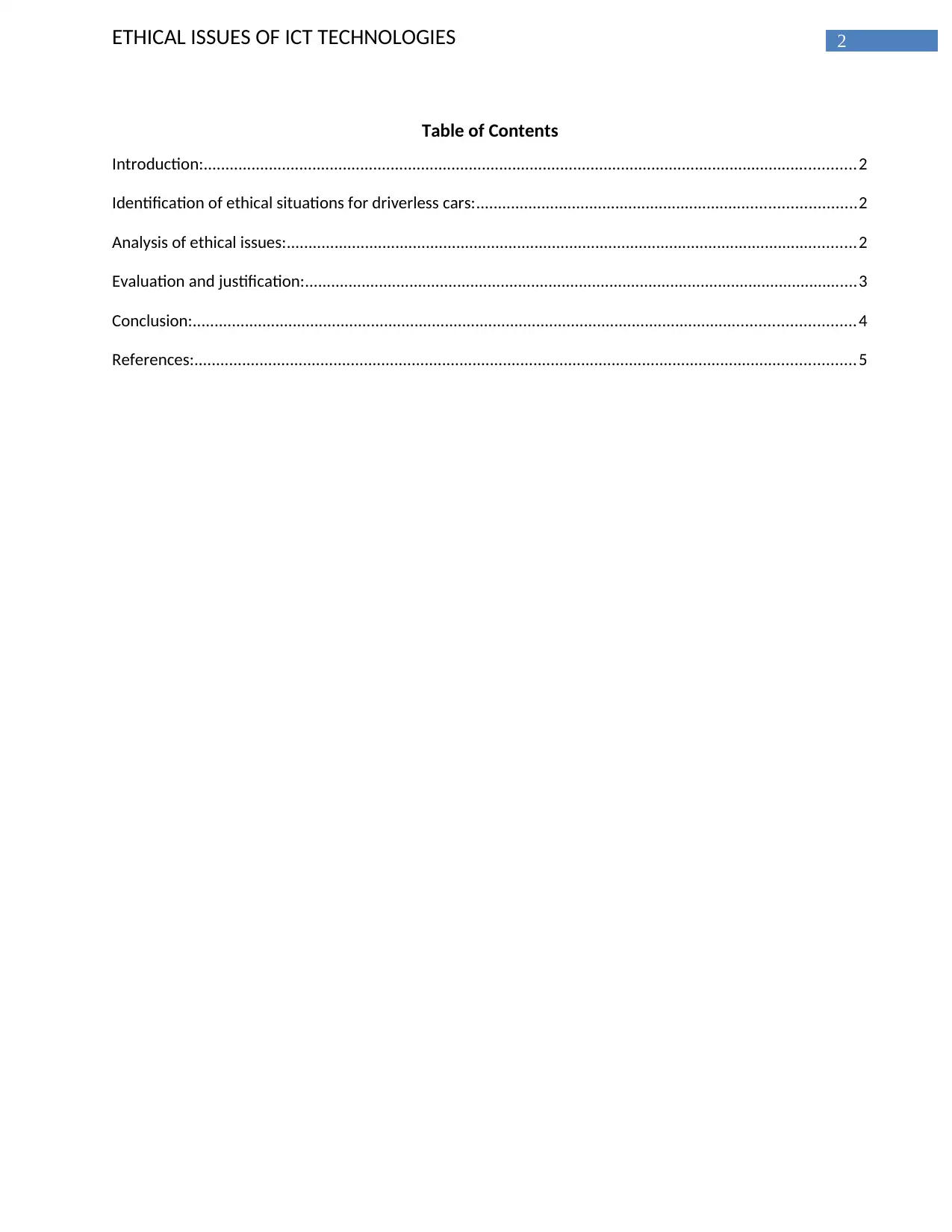
2ETHICAL ISSUES OF ICT TECHNOLOGIES
Table of Contents
Introduction:......................................................................................................................................................2
Identification of ethical situations for driverless cars:.......................................................................................2
Analysis of ethical issues:...................................................................................................................................2
Evaluation and justification:...............................................................................................................................3
Conclusion:........................................................................................................................................................4
References:........................................................................................................................................................5
Table of Contents
Introduction:......................................................................................................................................................2
Identification of ethical situations for driverless cars:.......................................................................................2
Analysis of ethical issues:...................................................................................................................................2
Evaluation and justification:...............................................................................................................................3
Conclusion:........................................................................................................................................................4
References:........................................................................................................................................................5
⊘ This is a preview!⊘
Do you want full access?
Subscribe today to unlock all pages.

Trusted by 1+ million students worldwide
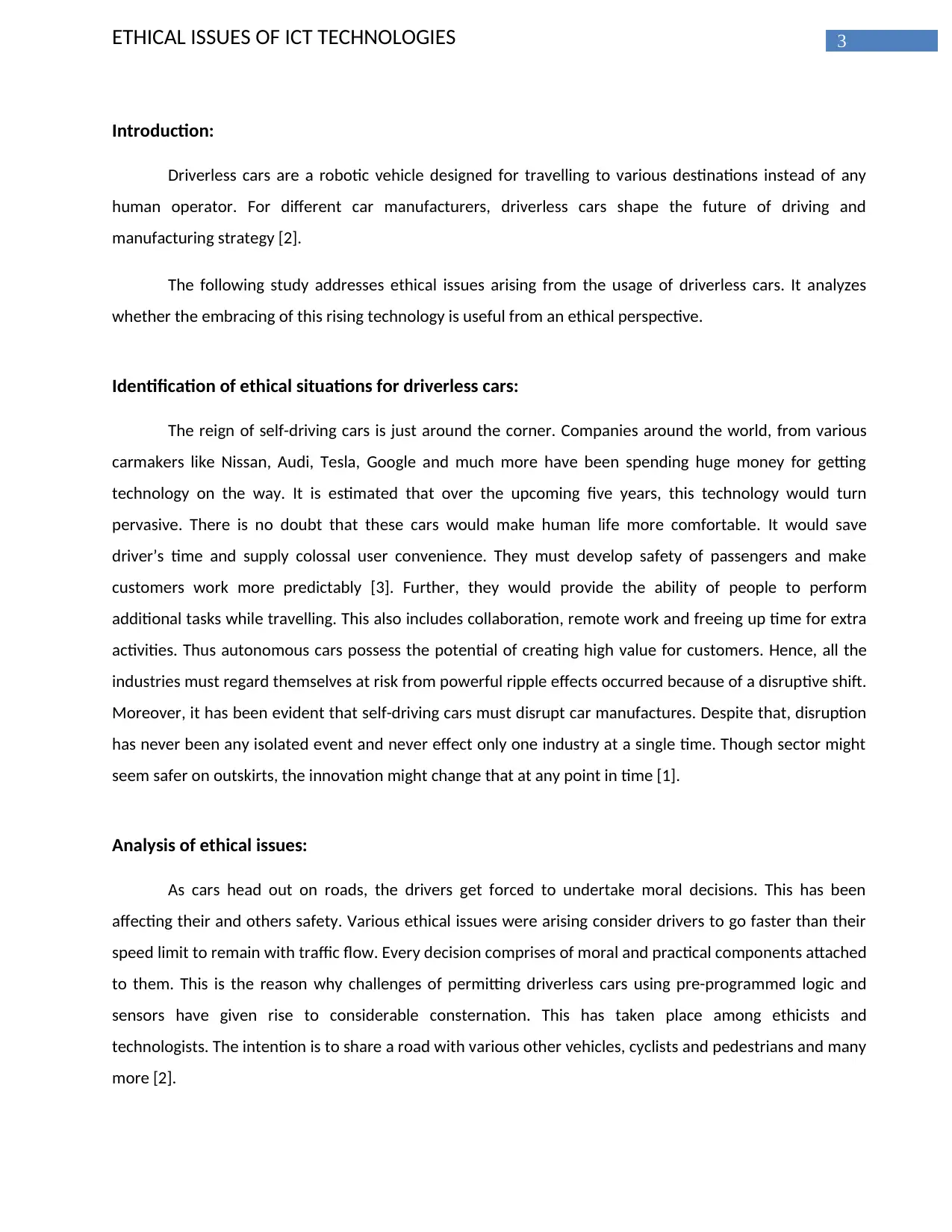
3ETHICAL ISSUES OF ICT TECHNOLOGIES
Introduction:
Driverless cars are a robotic vehicle designed for travelling to various destinations instead of any
human operator. For different car manufacturers, driverless cars shape the future of driving and
manufacturing strategy [2].
The following study addresses ethical issues arising from the usage of driverless cars. It analyzes
whether the embracing of this rising technology is useful from an ethical perspective.
Identification of ethical situations for driverless cars:
The reign of self-driving cars is just around the corner. Companies around the world, from various
carmakers like Nissan, Audi, Tesla, Google and much more have been spending huge money for getting
technology on the way. It is estimated that over the upcoming five years, this technology would turn
pervasive. There is no doubt that these cars would make human life more comfortable. It would save
driver’s time and supply colossal user convenience. They must develop safety of passengers and make
customers work more predictably [3]. Further, they would provide the ability of people to perform
additional tasks while travelling. This also includes collaboration, remote work and freeing up time for extra
activities. Thus autonomous cars possess the potential of creating high value for customers. Hence, all the
industries must regard themselves at risk from powerful ripple effects occurred because of a disruptive shift.
Moreover, it has been evident that self-driving cars must disrupt car manufactures. Despite that, disruption
has never been any isolated event and never effect only one industry at a single time. Though sector might
seem safer on outskirts, the innovation might change that at any point in time [1].
Analysis of ethical issues:
As cars head out on roads, the drivers get forced to undertake moral decisions. This has been
affecting their and others safety. Various ethical issues were arising consider drivers to go faster than their
speed limit to remain with traffic flow. Every decision comprises of moral and practical components attached
to them. This is the reason why challenges of permitting driverless cars using pre-programmed logic and
sensors have given rise to considerable consternation. This has taken place among ethicists and
technologists. The intention is to share a road with various other vehicles, cyclists and pedestrians and many
more [2].
Introduction:
Driverless cars are a robotic vehicle designed for travelling to various destinations instead of any
human operator. For different car manufacturers, driverless cars shape the future of driving and
manufacturing strategy [2].
The following study addresses ethical issues arising from the usage of driverless cars. It analyzes
whether the embracing of this rising technology is useful from an ethical perspective.
Identification of ethical situations for driverless cars:
The reign of self-driving cars is just around the corner. Companies around the world, from various
carmakers like Nissan, Audi, Tesla, Google and much more have been spending huge money for getting
technology on the way. It is estimated that over the upcoming five years, this technology would turn
pervasive. There is no doubt that these cars would make human life more comfortable. It would save
driver’s time and supply colossal user convenience. They must develop safety of passengers and make
customers work more predictably [3]. Further, they would provide the ability of people to perform
additional tasks while travelling. This also includes collaboration, remote work and freeing up time for extra
activities. Thus autonomous cars possess the potential of creating high value for customers. Hence, all the
industries must regard themselves at risk from powerful ripple effects occurred because of a disruptive shift.
Moreover, it has been evident that self-driving cars must disrupt car manufactures. Despite that, disruption
has never been any isolated event and never effect only one industry at a single time. Though sector might
seem safer on outskirts, the innovation might change that at any point in time [1].
Analysis of ethical issues:
As cars head out on roads, the drivers get forced to undertake moral decisions. This has been
affecting their and others safety. Various ethical issues were arising consider drivers to go faster than their
speed limit to remain with traffic flow. Every decision comprises of moral and practical components attached
to them. This is the reason why challenges of permitting driverless cars using pre-programmed logic and
sensors have given rise to considerable consternation. This has taken place among ethicists and
technologists. The intention is to share a road with various other vehicles, cyclists and pedestrians and many
more [2].
Paraphrase This Document
Need a fresh take? Get an instant paraphrase of this document with our AI Paraphraser
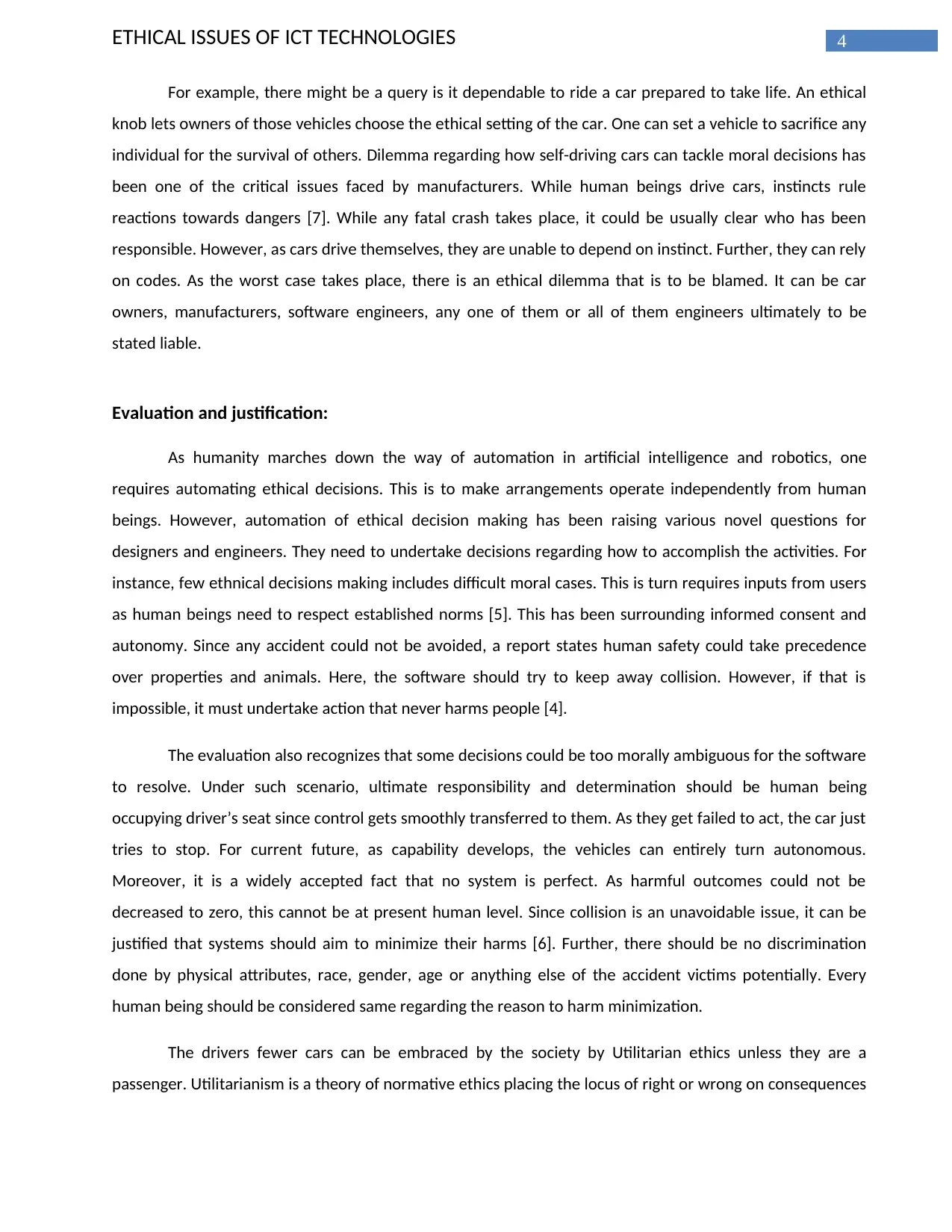
4ETHICAL ISSUES OF ICT TECHNOLOGIES
For example, there might be a query is it dependable to ride a car prepared to take life. An ethical
knob lets owners of those vehicles choose the ethical setting of the car. One can set a vehicle to sacrifice any
individual for the survival of others. Dilemma regarding how self-driving cars can tackle moral decisions has
been one of the critical issues faced by manufacturers. While human beings drive cars, instincts rule
reactions towards dangers [7]. While any fatal crash takes place, it could be usually clear who has been
responsible. However, as cars drive themselves, they are unable to depend on instinct. Further, they can rely
on codes. As the worst case takes place, there is an ethical dilemma that is to be blamed. It can be car
owners, manufacturers, software engineers, any one of them or all of them engineers ultimately to be
stated liable.
Evaluation and justification:
As humanity marches down the way of automation in artificial intelligence and robotics, one
requires automating ethical decisions. This is to make arrangements operate independently from human
beings. However, automation of ethical decision making has been raising various novel questions for
designers and engineers. They need to undertake decisions regarding how to accomplish the activities. For
instance, few ethnical decisions making includes difficult moral cases. This is turn requires inputs from users
as human beings need to respect established norms [5]. This has been surrounding informed consent and
autonomy. Since any accident could not be avoided, a report states human safety could take precedence
over properties and animals. Here, the software should try to keep away collision. However, if that is
impossible, it must undertake action that never harms people [4].
The evaluation also recognizes that some decisions could be too morally ambiguous for the software
to resolve. Under such scenario, ultimate responsibility and determination should be human being
occupying driver’s seat since control gets smoothly transferred to them. As they get failed to act, the car just
tries to stop. For current future, as capability develops, the vehicles can entirely turn autonomous.
Moreover, it is a widely accepted fact that no system is perfect. As harmful outcomes could not be
decreased to zero, this cannot be at present human level. Since collision is an unavoidable issue, it can be
justified that systems should aim to minimize their harms [6]. Further, there should be no discrimination
done by physical attributes, race, gender, age or anything else of the accident victims potentially. Every
human being should be considered same regarding the reason to harm minimization.
The drivers fewer cars can be embraced by the society by Utilitarian ethics unless they are a
passenger. Utilitarianism is a theory of normative ethics placing the locus of right or wrong on consequences
For example, there might be a query is it dependable to ride a car prepared to take life. An ethical
knob lets owners of those vehicles choose the ethical setting of the car. One can set a vehicle to sacrifice any
individual for the survival of others. Dilemma regarding how self-driving cars can tackle moral decisions has
been one of the critical issues faced by manufacturers. While human beings drive cars, instincts rule
reactions towards dangers [7]. While any fatal crash takes place, it could be usually clear who has been
responsible. However, as cars drive themselves, they are unable to depend on instinct. Further, they can rely
on codes. As the worst case takes place, there is an ethical dilemma that is to be blamed. It can be car
owners, manufacturers, software engineers, any one of them or all of them engineers ultimately to be
stated liable.
Evaluation and justification:
As humanity marches down the way of automation in artificial intelligence and robotics, one
requires automating ethical decisions. This is to make arrangements operate independently from human
beings. However, automation of ethical decision making has been raising various novel questions for
designers and engineers. They need to undertake decisions regarding how to accomplish the activities. For
instance, few ethnical decisions making includes difficult moral cases. This is turn requires inputs from users
as human beings need to respect established norms [5]. This has been surrounding informed consent and
autonomy. Since any accident could not be avoided, a report states human safety could take precedence
over properties and animals. Here, the software should try to keep away collision. However, if that is
impossible, it must undertake action that never harms people [4].
The evaluation also recognizes that some decisions could be too morally ambiguous for the software
to resolve. Under such scenario, ultimate responsibility and determination should be human being
occupying driver’s seat since control gets smoothly transferred to them. As they get failed to act, the car just
tries to stop. For current future, as capability develops, the vehicles can entirely turn autonomous.
Moreover, it is a widely accepted fact that no system is perfect. As harmful outcomes could not be
decreased to zero, this cannot be at present human level. Since collision is an unavoidable issue, it can be
justified that systems should aim to minimize their harms [6]. Further, there should be no discrimination
done by physical attributes, race, gender, age or anything else of the accident victims potentially. Every
human being should be considered same regarding the reason to harm minimization.
The drivers fewer cars can be embraced by the society by Utilitarian ethics unless they are a
passenger. Utilitarianism is a theory of normative ethics placing the locus of right or wrong on consequences
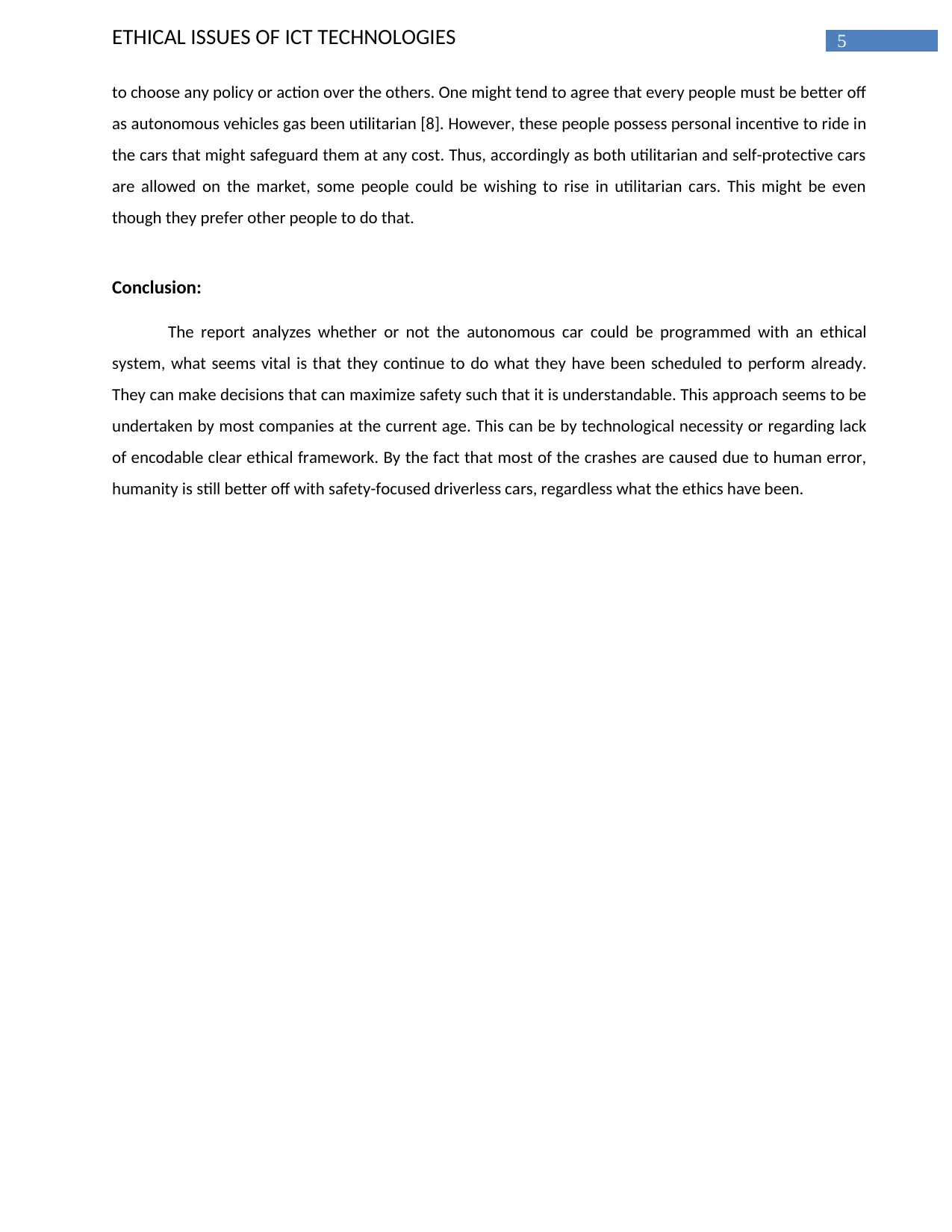
5ETHICAL ISSUES OF ICT TECHNOLOGIES
to choose any policy or action over the others. One might tend to agree that every people must be better off
as autonomous vehicles gas been utilitarian [8]. However, these people possess personal incentive to ride in
the cars that might safeguard them at any cost. Thus, accordingly as both utilitarian and self-protective cars
are allowed on the market, some people could be wishing to rise in utilitarian cars. This might be even
though they prefer other people to do that.
Conclusion:
The report analyzes whether or not the autonomous car could be programmed with an ethical
system, what seems vital is that they continue to do what they have been scheduled to perform already.
They can make decisions that can maximize safety such that it is understandable. This approach seems to be
undertaken by most companies at the current age. This can be by technological necessity or regarding lack
of encodable clear ethical framework. By the fact that most of the crashes are caused due to human error,
humanity is still better off with safety-focused driverless cars, regardless what the ethics have been.
to choose any policy or action over the others. One might tend to agree that every people must be better off
as autonomous vehicles gas been utilitarian [8]. However, these people possess personal incentive to ride in
the cars that might safeguard them at any cost. Thus, accordingly as both utilitarian and self-protective cars
are allowed on the market, some people could be wishing to rise in utilitarian cars. This might be even
though they prefer other people to do that.
Conclusion:
The report analyzes whether or not the autonomous car could be programmed with an ethical
system, what seems vital is that they continue to do what they have been scheduled to perform already.
They can make decisions that can maximize safety such that it is understandable. This approach seems to be
undertaken by most companies at the current age. This can be by technological necessity or regarding lack
of encodable clear ethical framework. By the fact that most of the crashes are caused due to human error,
humanity is still better off with safety-focused driverless cars, regardless what the ethics have been.
⊘ This is a preview!⊘
Do you want full access?
Subscribe today to unlock all pages.

Trusted by 1+ million students worldwide
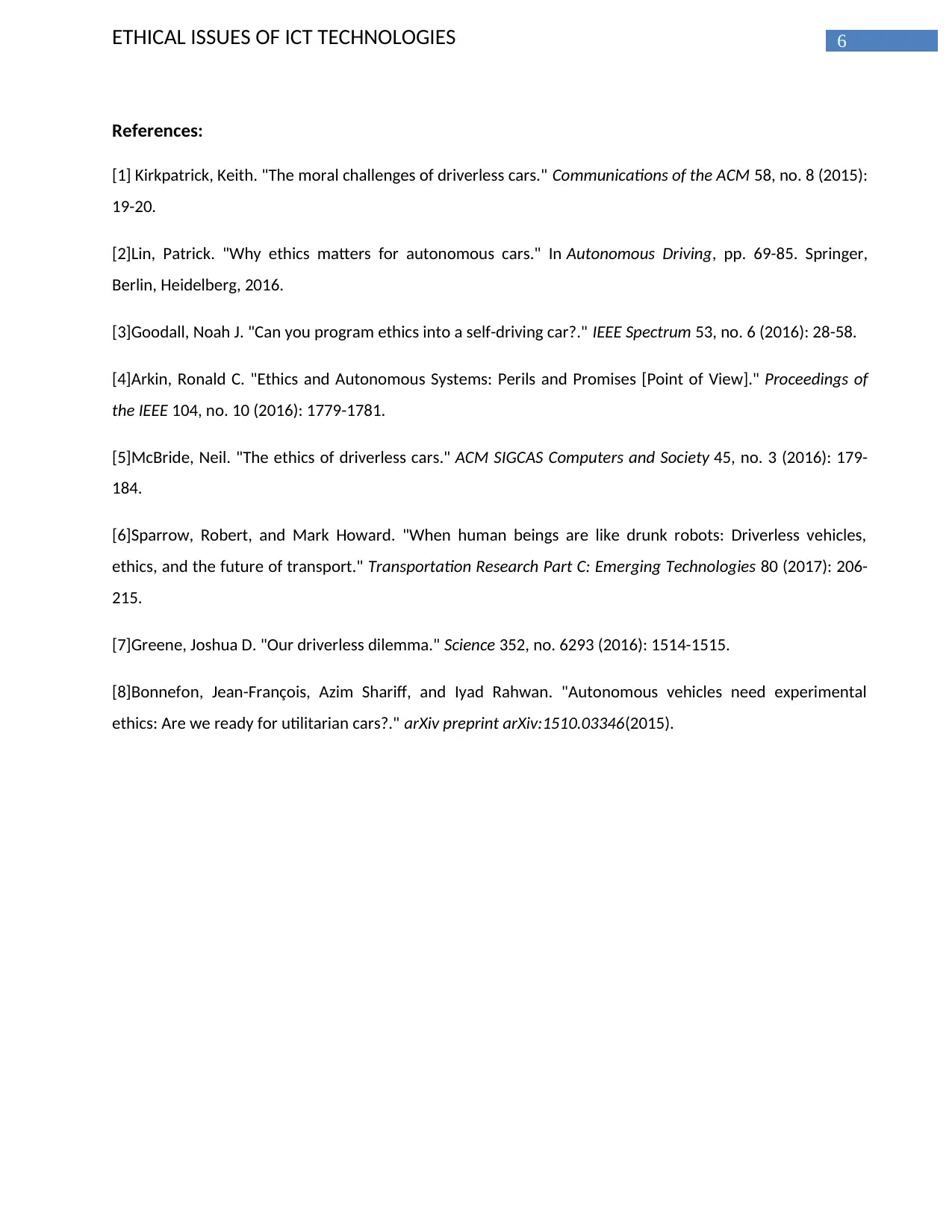
6ETHICAL ISSUES OF ICT TECHNOLOGIES
References:
[1] Kirkpatrick, Keith. "The moral challenges of driverless cars." Communications of the ACM 58, no. 8 (2015):
19-20.
[2]Lin, Patrick. "Why ethics matters for autonomous cars." In Autonomous Driving, pp. 69-85. Springer,
Berlin, Heidelberg, 2016.
[3]Goodall, Noah J. "Can you program ethics into a self-driving car?." IEEE Spectrum 53, no. 6 (2016): 28-58.
[4]Arkin, Ronald C. "Ethics and Autonomous Systems: Perils and Promises [Point of View]." Proceedings of
the IEEE 104, no. 10 (2016): 1779-1781.
[5]McBride, Neil. "The ethics of driverless cars." ACM SIGCAS Computers and Society 45, no. 3 (2016): 179-
184.
[6]Sparrow, Robert, and Mark Howard. "When human beings are like drunk robots: Driverless vehicles,
ethics, and the future of transport." Transportation Research Part C: Emerging Technologies 80 (2017): 206-
215.
[7]Greene, Joshua D. "Our driverless dilemma." Science 352, no. 6293 (2016): 1514-1515.
[8]Bonnefon, Jean-François, Azim Shariff, and Iyad Rahwan. "Autonomous vehicles need experimental
ethics: Are we ready for utilitarian cars?." arXiv preprint arXiv:1510.03346(2015).
References:
[1] Kirkpatrick, Keith. "The moral challenges of driverless cars." Communications of the ACM 58, no. 8 (2015):
19-20.
[2]Lin, Patrick. "Why ethics matters for autonomous cars." In Autonomous Driving, pp. 69-85. Springer,
Berlin, Heidelberg, 2016.
[3]Goodall, Noah J. "Can you program ethics into a self-driving car?." IEEE Spectrum 53, no. 6 (2016): 28-58.
[4]Arkin, Ronald C. "Ethics and Autonomous Systems: Perils and Promises [Point of View]." Proceedings of
the IEEE 104, no. 10 (2016): 1779-1781.
[5]McBride, Neil. "The ethics of driverless cars." ACM SIGCAS Computers and Society 45, no. 3 (2016): 179-
184.
[6]Sparrow, Robert, and Mark Howard. "When human beings are like drunk robots: Driverless vehicles,
ethics, and the future of transport." Transportation Research Part C: Emerging Technologies 80 (2017): 206-
215.
[7]Greene, Joshua D. "Our driverless dilemma." Science 352, no. 6293 (2016): 1514-1515.
[8]Bonnefon, Jean-François, Azim Shariff, and Iyad Rahwan. "Autonomous vehicles need experimental
ethics: Are we ready for utilitarian cars?." arXiv preprint arXiv:1510.03346(2015).
Paraphrase This Document
Need a fresh take? Get an instant paraphrase of this document with our AI Paraphraser

7ETHICAL ISSUES OF ICT TECHNOLOGIES

8ETHICAL ISSUES OF ICT TECHNOLOGIES
⊘ This is a preview!⊘
Do you want full access?
Subscribe today to unlock all pages.

Trusted by 1+ million students worldwide
1 out of 9
Related Documents
Your All-in-One AI-Powered Toolkit for Academic Success.
+13062052269
info@desklib.com
Available 24*7 on WhatsApp / Email
![[object Object]](/_next/static/media/star-bottom.7253800d.svg)
Unlock your academic potential
Copyright © 2020–2026 A2Z Services. All Rights Reserved. Developed and managed by ZUCOL.





